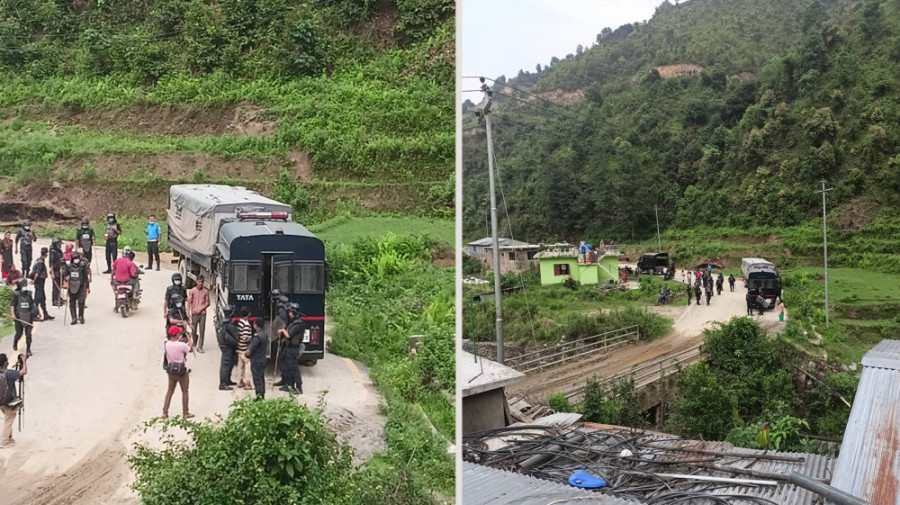Valley
Garbage disposal finally resumes with police help
Officials say 150 truckloads of garbage was dumped at the Banchare Danda landfill Tuesday.
Post Report
After seven weeks of disruption, disposal of Kathmandu Valley’s garbage finally resumed Tuesday at Banchare Danda landfill on the border of Nuwakot and Dhading districts, after police cleared obstruction created by locals.
Around 150 lorries carrying garbage from Kathmandu Valley have unloaded the trash at the landfill site by Tuesday evening.
Police had detained around a dozen protesting locals after they tried to stop the garbage trucks from reaching the landfill site.
“As the locals have not suspended their protests, we may have to take help from law enforcement agencies on Wednesday also,” said Sarkardeep Shrestha, an official at the Kathmandu Metropolitan City.
Following an agreement between the Metropolitan City, Ministry of Urban Development, and local representatives from Sisdole and Banchare Danda on Monday evening, dozens of trucks carrying garbage from the Kathmandu Valley had reached the landfill site early in the morning on Tuesday.
But enraged locals, who were unaware about the agreement signed the previous day, barricaded the road preventing the trucks from reaching the landfill.
“Around a dozen of our friends were detained by the police in the morning,” said Chandra Bahadur Balami, a member of the Banchare Danda Waste Management Struggle Committee. “Instead of addressing the demands of the locals, the authorities prefer to take help from security agencies.”
Police said they removed the protesting locals from the vicinity of the landfill site after they attempted to vandalise the garbage trucks.
“We only removed the protesters from the landfill site,” said Gautam Mishra, Deputy Superintendent of Police at Metropolitan Police Circle, Balaju. “We have not arrested anyone.”
In the agreement signed on Monday, the ministry has agreed to allocate Rs 425 million to construct five different roads that lead to Banchare Danda while Rs17 million has been allocated for river embankment, construction of a community building, and tree plantation in the area. All of these works will be carried out in the new fiscal year 2022-23, as per the agreement.
The City has announced its plan to start the process to provide health insurance services to the residents of the affected area within a week. The beneficiaries of the insurance service will be residents of Dhunibeshi Municipality’s wards 1, 3, 4 and Kakani Rural Municipality’s wards 1, 2 and 3. Furthermore, the City has announced plans to continue providing grants for other infrastructure development work in the wards.
The City has also announced that it will segregate solid waste as biodegradable and non-biodegradable at the source itself starting June 15.
The Ministry of Urban Development has also announced plans to start a land acquisition drive in the affected area.
Locals complained that authorities concerned did not listen to their genuine demands. Along with 18 local units of the Kathmandu Valley including the Kathmandu Metropolitan City, some local units of Kavrepalanchok also dispose of trash in Banchare Danda.
“We have been living with the trash of the capital city and other local levels of the Valley for over 17 years,” said Suman Tamang, a local from Sisdole area. “But none of our demands which were agreed upon repeatedly by the authorities concerned have been fulfilled so far. Our life has become hell. And authorities opted for suppression instead of fulfilling our just demands.”
Due to the protests of the locals in the Sisdole area, door-to-door garbage collection remains stalled in the Kathmandu Valley for about two months.
“We agree that life has become difficult in the Valley due to the ongoing disruption in garbage collection, but can you imagine, how are we living here tolerating the foul smell from the landfill site for the last 17 years,” said Balami, who is also a former ward chair of Kakani Rural Municipality-1.
Relocation of the settlements near the landfill sites, development of better amenities, and preventing garbage trucks from dropping trash and lichete on the road are among the demands of the locals of the affected areas.
Despite the past commitments, the authorities concerned have not even repaired the roads to the landfill sites for years. Although an eight-kilometer section of the Pasang Lhamu Highway which was widened some eight years ago, it has not been blacktopped yet.
Locals also complained that the trucks have been carrying more garbage than their capacity and when they jolt in the pothole-ridden road, lumps of trash fall from the trucks along the road.
“We want authorities concerned to start doing what can be done immediately,” said Balami.
Experts, meanwhile, say the authorities should work seriously to find a long-term solution to the garbage problem. One immediate step is segregation of waste, at the source itself, they say.
“Until and unless we change our attitude from waste disposal to waste management, we will not reach any solution,” said Kishor Thapa, a former secretary who is also an expert on urban development. “To solve the garbage problem, we should go to its roots and segregate garbage and start management accordingly.”
Waste management has been a perennial problem in Kathmandu Valley, which produces around 1,200 tonnes of garbage every day.
Experts say along with finding immediate solutions, authorities should not forget that disposal of all kinds of waste in landfill sites will only complicate the problem.
“The just demands of the people of the affected areas should be addressed, agreements should be implemented sincerely, and authorities should work on long-term management of waste,” said Jaya Kumar Gurung, a senior environmentalist.




 22.12°C Kathmandu
22.12°C Kathmandu











